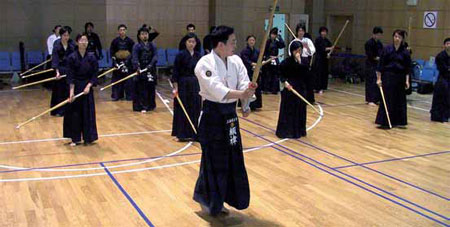Executives reach breaking point
Updated: 2012-09-21 13:31
By Lu Chang and Li Aoxue (China Daily)
|
|||||||||||
|
Young white collar workers in a pillow war at the One Club in Beijing on Dec 30, 2011. Pillow wars are becoming a popular way for Chinese executives to deal with work pressure. Provided to China Daily |
|
Office workers in Shanghai practice kendo, a Japanese form of sword fighting, to relieve work stress. Provided to China Daily |
Stress among managers in China is mounting, even causing deaths at work. What is pushing them to the brink?
| ||||
As the CEO of an Australian foreign exchange trading company, he has a laundry list of tasks and roles, from dealing with hundreds of emails every day, reporting to the board and investors to giving directions to his employees.
"From the moment I get into the office till the time my head hits the pillow, I've worked almost 15 hours a day," the 30-year-old executive says. "I should take some time off before I burn out."
Like Dong, many business leaders in China are saddled with enormous pressures. But stress among senior executives is often not discussed in the corporate world, where working 80 to 100 hours a week is the norm.
China Daily found out, however, that stress and problems related to high stress are more common and serious than many employers are willing to admit. Sixty percent of business executives in China say they have seen their stress increase in 2011, according to Grant Thornton, an international business research accounting firm.
The number is 28 percent higher than the average stress level around the world and the second-highest after Greece, which is currently under a deep depression with 67 percent of senior executives admitting a spike in stress levels.
Jonathan Geldart, the global head of marketing and communications at Grant Thornton International Ltd, says the problem is getting serious and sometimes dangerous because stress can force business leaders to make decisions too quickly or worst of all, take the wrong direction.
"Eventually it can affect the profitability of a company or even bankrupt it if the stress is not managed because you are stressed and you don't look thoughtfully at all of the issues," he says. Geldart says there is more pressure on the Chinese government to fix the nation's ills.
"That means that their responsibility is higher," he says. "The Chinese government is clamping down on many aspects of business corruption in particular, in taxation, in improving the accounting standards and in encouraging people to go overseas, so the pressure is rising. And the economy is not doing as well as it used to. So there is a higher pressure in China than other places."
The American Institute of Stress estimates that American companies lose over $300 billion (230 billion euros every year due to stress and stress-related diseases such as absences, exhaustion and mental health problems.
According to RMG International, a recruitment consultancy in Beijing, work pressure costs Chinese businesses more than $100 million each year.
A recent example of what stress can do in China happened earlier this month. A 25-year-old employee of Kingsoft, a software company in Beijing, died at his desk after spending the night in the office. The company denied that too much work contributed to the tragedy.
The company, however, had posted on one of its accounts on Sina Weibo, a Twitter-like service, in late August showing a photo of a man sleeping on his desk with the caption: "This man has been working overtime and has stayed out of bed for a week."
In recent months, unexplainable deaths have been more common in China's financial sector.
In May, a 34-year-old senior manager in the legal department of CITIC Securities, China's largest listed securities company by total market value, died of cerebral hemorrhage. The death triggered a heated public discussion with many saying that the death resulted from the manager being overworked.
Peer pressure
Experts say several of the deaths are closely related to being overworked as well as intense pressure from peers, the fear of "losing face" and unrealistic business expectations in the workplace.
Mike Thompson, a professor of management practice at the China Europe International Business School in Shanghai, says that in China there is a great amount of pressure on an individual to be seen as successful among peers.
Robert Parkinson, CEO and founder of RMG, says that money leads to pressures to live a prestigious life, to have a nice apartment, to join a nice club and to marry a pretty girl.
"People are fearful of losing their position in society or lose their money when they become rich," he says. "In China 40 or 50 years ago, people were concerned about whether they had have enough to eat or if they had enough basic things.
But as China has rapidly expanded its economy with the huge level of disposable income available to the Chinese people, things have changed. This competition to have more things in life will never end if your only value is money."
The increasing desire for luxury goods in China is an apt explanation of why people seemed more stressed in China than in other countries. Here, people are trying to live up to a social status they've created for themselves.
Thompson says in the West people have had luxury brands for years. But in China, the phenomenon only began about 10 years ago.
"Luxury goods are often used as signals of social success and status," he says. "The tension is created once you get one luxury product. Then you are in a game and you are under pressure because it makes you want to earn more money."
All about face
One of the results from the Grant Thornton survey is that business people in the United Kingdom and France have the lowest stress levels in the world.
Thompson, who was born in the UK and has been working in China for more than three years, says one of the causes of lower stress levels in the workplace in the UK is directly connected with humor or wit that works as a relief to stress. He says it's a very common factor across all UK workplaces.
"It is more acceptable and more usual to use and express humor at the expense of someone else in the UK than in other places, particularly in China," he says. "Humor can lower stress because the use of humor actually allows a person to more fully disclose who they really are."
But Parkinson says in China, people care most about losing face. "What does losing face mean? It means looking stupid," he says.
"In my interpretation, people in China care very much about what people think of them and that causes lots of stress. In fast-moving competitive working environments, you can have conflicts and misunderstandings very easily."
Oliver Barron, the head of the Beijing division of NSBO China, a UK-based Chinese policy investment research firm, says the Chinese concept of losing face makes managing workers very difficult. Losing face is another source of pressure for many foreign managers in China.
"Western managers are more direct than Chinese so there are many things that you could say, even criticism, to a colleague," he says. "But you can't say that in China because you want to give your employees face or you don't want them to lose face."
Heavy workload
Experts say that a heavy workload and high expectations are two major sources of stress for senior managers.
According to the report by Grant Thornton, 24 percent of respondents from China believe their stress stems from the pursuit of business goals, while 20 percent of the respondents reported difficulties in finding a work-life balance.
"I think the expansion of personal performance targets is one of the chief causes in the rise of stress internationally and particularly in China, where I think the competitive nature of the market is stronger than in the West," says CEIBS' Thompson. "You have got this business target pressure that puts people into a situation where they are overstressed."
In the face of stress, many senior managers are trying to manage the pressure by delegating work to others, while some are finding other ways to help ease their stress, such as meditation, exercising and traveling.
Although Dong, the CEO of an Australian foreign exchange trading company, has no time to take a vacation, he makes an effort to get out and sightsee during his business trips. "That really takes some load off my shoulders," he says.
Barron also recommends meditation on a regular basis.
"Ten minutes everyday is more important than an hour every week, and the simplest technique is to focus on your breathing," he says. "Perpetual wanting is human nature but I think it is very dangerous. So meditation gives you 10 minutes a day when you are not thinking what you are going to do, who you are going to meet, and what you are going to eat after work."
Thompson says that exercise or vacations are only a temporary relief from stress.
"The more permanent way to get rid of stress is by living from within and from discovering who you really are and taking a step back and looking at yourself," he says. "Perhaps enjoying humor because it is energizing and can also reveal a lot about you."
Contact the writer at lvchang@chinadaily.com.cn and liaoxue@chinadaily.com.cn
(China Daily 09/20/2012 page12)
Today's Top News
Rescuers race against time for quake victims
Telecom workers restore links
Coal mine blast kills 18 in Jilin
Intl scholarship puts China on the map
More bird flu patients discharged
Gold loses sheen, but still a safe bet
US 'turns blind eye to human rights'
Telecom workers restore links
Hot Topics
Lunar probe , China growth forecasts, Emission rules get tougher, China seen through 'colored lens', International board,
Editor's Picks

|

|

|

|

|

|









